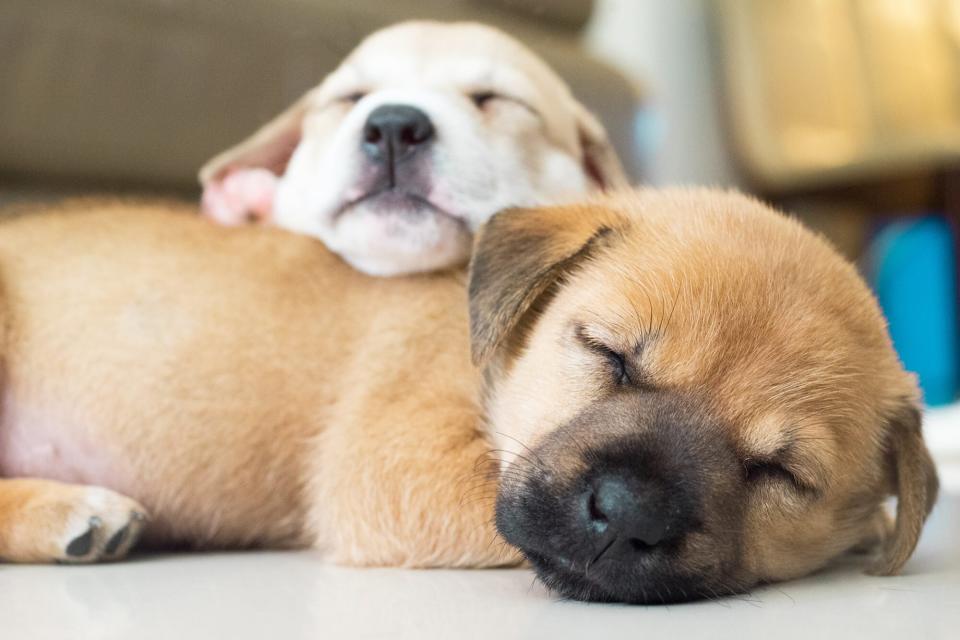How Much Sleep Do Puppies Need?
You've got yourself a bouncy, happy new puppy. You figured out just what to feed her so she grows up big and strong. You've taken her to the veterinarian for a checkup and shots. She's healthy!
Now why is she sleeping so much?
Is It Normal for Puppies to Sleep a Lot?
Healthy puppies need a lot of nap time, says Jeff Werber, DVM, a practicing veterinarian and veterinary medical journalist in Southern California. Even 18 hours per day can be perfectly normal.
Puppies whiz around, using up a bunch of energy and building muscles and brain power, then they need to conk out. Long stretches of nighttime sleep punctuated by frequent naps are A-OK—even as many as 20 naps a day, according to Werber.
"Remember, puppies grow a lot more quickly than we do," Werber says. "Because of that rapid growth, they need to eat a lot, and they need a lot of sleep."
How Much Sleep Do Puppies Need?
There's no one-size-fits-all answer to how much sleep a puppy needs. Each puppy is different, with different genes, a different environment, and different pet parents with varying schedules.
Werber's main advice is, if your puppy wants to sleep, let her sleep. If your puppy wants to play, play with her. If you're busy, make sure she's got another pet or some fun toys to play with.

Joseph Lim / EyeEm / Getty
Getting Your Puppy on a Sleep Schedule
If your puppy wants to play when you can't, like when you're doing chores or work at home, or when it's the middle of the night, it might be time to adjust your growing, impressionable puppy to your schedule. But do it slowly, Werber recommends.
"Dogs are creatures of habit, and they adjust to our schedules," he says. "I don't need an alarm clock, because I usually get up at 5:30 a.m. and my dog wakes me up. I don't know how he does it on the minute."
Feed at regular times. Go to bed at regular times. Your puppy might be a little more energetic than an adult dog, but puppies adjust. If you don't want to play, give your puppy something to entertain him, Werber recommends.
How to Get a Puppy to Sleep Through the Night
If you and your puppy have developed a crazy schedule with lots of nighttime awake time, you can fix that, Werber says.
Dogs respond to your social cues and your behavior. If you don't want to play, "ignore them," he says, and make sure they have other things they can do without you.
The important thing is getting your puppy on a regular schedule. Your pup should sleep whenever he wants, but you need to gently teach through regular mealtimes and bedtimes when it's time for food and fun. Keep a regular bedtime schedule, and your puppy will learn when you're willing to play and when you're not.
When to See a Vet
Are you still worried that your puppy is sleeping too much? Werber says, don't worry.
"The gauge for me is not how long the puppy sleeps," he says. "I want to know what their activity level and personality and appetite are like when they're up."
Long hours of sleep are nothing to worry about. Instead, watch for:
Activity level. If your puppy is less active between sleeping sessions than she was, "or she gets worn out fast, within a minute or two after waking up, that could be a heart issue or a bone issue," Werber says.
Personality. If your puppy seems not quite himself, that could be nothing or may be a sign of a neurological issue. "Is there some motion or some behavior that's not normal for that dog?" Werber asks. It's worth a vet checkup.
Appetite. Puppies need a lot of calories, so if your dog is suddenly not finishing meals or more hungry than usual, it's good to get her checked out by a vet.
RELATED: How Much Should My Puppy Eat?
If you notice your puppy breathing fast, whimpering, or twitching in her sleep, does that mean something is wrong? Not at all, Werber says: "That's the dog dreaming. It's totally normal."
That means you shouldn't wake up your dog when you notice those movements, which indicate deep, restorative sleep that your pup needs.
But is there a chance you could be seeing a seizure, not sleep? The chance is slim, according to Werber. This would only be a worry if you can't wake up your puppy when these movements occur. In that case, check with your veterinarian, because seizures can be serious.
"Otherwise, leave them alone and let them dream," he says. "You'll know your dog has caught a lot of rabbits in his sleep."

